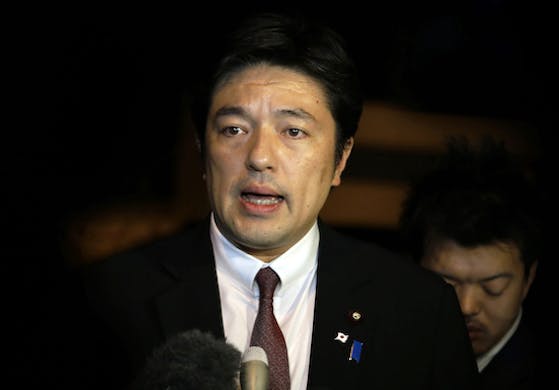Japanese Official Calls for Trilateral Security Agreement With Israel, U.S.
‘Israel has very good tech, the U.S. is very good at technology in other ways. But Japan is very good at manufacturing.’

JERUSALEM — With tensions rising in Asia, one of Shinzo Abe’s top former advisers, during a visit to the Jewish state, is calling for a trilateral defense partnership between Japan, America, and Israel.
Yasuhide Nakayama is the highest-profile Japanese figure to visit Israel since the assassination of Prime Minister Abe three weeks ago. Currently out of government, Mr. Nakayama was in Israel for a parley promoting private-sector ties between the nations.
Mr. Nakayama served as state minister for foreign affairs under Abe, and says he had a “very close” relationship with the late leader.
“I was at the hospital with him that night,” Mr. Nakayama said. He drove 40 minutes from Osaka and spent the night at Abe’s bedside. Both men come from Japanese political dynasties, and they were the third generation of their respective families to serve together in the National Diet, Japan’s parliament.
Mr. Nakayama, as president of the Japan-Israel Parliamentary League, played a role in Abe’s pivot toward Israel and the strengthening of ties between the two nations. The Israeli ambassador at Tokyo, Gilad Cohen, once called the late prime minister “the architect of modern Israeli relations with Japan.”
“He really considered himself a true friend of Israel,” Mr. Cohen told the Sun. Abe was “influenced” by Israeli high tech and the country’s deployment of emergency resources to help Japan in the aftermath of the 2011 tsunami.
Abe visited Israel twice and hosted Prime Minister Netanyahu in Japan. Under his leadership, the nations signed more than 16 agreements — including investment pacts for cyber-security and agricultural technology. According to the American Jewish Committee, Japanese investment in Israel during Abe’s second term increased to more than $6 billion from $20 million.
“He told me, ‘Everything related to Israel — it depends on you, you are responsible,’” Mr. Nakayama recalled Abe saying. Mr. Nakayama was part of the Japanese prime minister’s first delegation to Israel in 2015 and planned much of the trip.
Mr. Nakayama is now calling for a trilateral security agreement between Japan, Israel, and America. He sees a defense-technology alliance between the three nations as the best way to counter the resources of Communist China, whose new aircraft capabilities made a big splash in June.
“Israel has very good tech, the U.S. is very good at technology in other ways. But Japan is very good at manufacturing,” Mr. Nakayama said.
Mr. Nakayama is currently a venture partner focusing on Israeli high-tech startups, as well as a research adviser to the Diet, focused on game-changing technologies. His firm has invested in an Israeli drone technology company, XTend, that produces devices used by the Navy SEALs and NATO.
“Now we are trying to move the headquarters of XTend to Japan and also assemble everything … in Japan, then export to the U.S.,” Mr. Nakayama said. Innovators, he explained, love the “precision” and speed of Japanese manufacturing.
Cyber warfare is an important front for Japanese-Israeli collaboration, Mr. Nakayama says. Because of cybersecurity attacks, China can now attack Japan without touching Japanese soil, he says. He also points to space and electromagnetic warfare as key areas of potential defense collaboration.
“I am Mr. Israel in Japan,” Mr. Nakayama said of his reputation for supporting the Jewish state. His views, however, are not shared by all in Japan, which has long been wary of alienating Israel’s enemies.
Mr. Nakayama came under fire for a tweet supporting Israel in its 2021 war with Hamas. “Our hearts are with Israel,” he said in a since-deleted tweet that also referred to Hamas as “terrorists,” breaking with the common Japanese rhetoric that supports de-escalation on both sides.
Japan’s caution is partly because of its dependence on foreign oil. During the boycott by the Organization of Arab Petroleum Exporting Countries, Japan suffered, and subsequently invested in diplomatic relations with Arab states. Now, because of the Abraham Accords, these concerns are mostly moot.
“Once a businessman may have thought if you do business with Israel, you’ll hurt your business with Saudi Arabia or the Emirates, but it’s no longer that way,” the Israeli ambassador to Japan, Mr. Cohen, said.
Japan also imported about 4 percent of its oil from Israel’s greatest strategic threat, Iran, until the Trump administration reinstated sanctions against the Islamic Republic in 2019.
Mr. Nakayama, however, foresees a deterioration of Japanese-Iranian relations as people realize the strength of Iranian-North Korean relations — particularly their collaboration on nuclear missile technology.
Israel has also come under criticism for Communist Chinese control of its Haifa Port, but Israel recently rejected a Chinese bid to build a new light rail in Tel Aviv, though the Chinese had offered the lowest price of all prospective builders. That signals a turning point in its strategic alignment, according to Mr. Nakayama.
Japan and Israel, Mr. Cohen says from Tokyo, “are really on the same side as the United States, with the West, with the peace-loving democracies that have to work together to maintain peace and stability in the world.”

